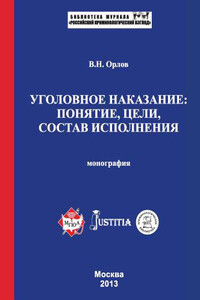Уголовное наказание: понятие, система, объект назначения, состав отбывания. Монография - [72]
XX. Undergoing the penal activity is a process, as a result of which the convict undergoes the deprivation, limitation, exchange and amendments of rights, obligations and legal interests. In its criminal executive sense, the undergoing of the criminal penalty has a number of psychological and legal features: 1) eligibility; 2) unavoidability; 3) criminal penological safety;
XXI. The order of servicing the penalty should be understood as a provided by the criminal executive legislation systematic process, characterized by a definite sequence, a systematic process of servicing the penalty. Conditions of servicing the penalty represent rules of conduct by the subjects of penalty servicing, provided by the criminal executional legislation, along with the situation, circumstances, medium within the penalty servicing. The situation of the penalty servicing is a complex of aspect, forming the possibility of servicing the penalty. The circumstances of penalty servicing are features, which come along and are interdependent with servicing the penalty. The medium of servicing the penalty is things, accidents, etc., surrounding the convict;
XXII. It is necessary to distinguish between two types of the regime: 1) regime of executing the penalty – which represents a fixed order of penalty execution; 2) regime of servicing the penalty – is a fixed order of penalty servicing. These types of regimes differ from each other in their contents, character, features of legislative regulation, etc.;
XXIII. The progressive system of penalty servicing should be understood as incremental changes of elements of the contents of penalty servicing, depending on the conduct of the convict, desired goal and the arrived consequences, including the achieved results. The progressive system of the objective side of penalty servicing represents a incremental changing of features, characterizing the outer side of penalty servicing, depending on the conduct of the convict, the desired goals and the arrived consequences (including the achieved results);
XXIV The place of penalty servicing is a definite territory, where the penalty is served. The term of penalty servicing is a period of time, during which the convict serves his penalty. Means of servicing the penalty represents a number of equipment, by use of which the penalty is served. The way of penalty servicing is a complex of patterns and methods, used by the convicts within the penalty servicing.
XXV. “The execution of penalty in the form of compulsory and correctional working, limitation of freedom according to the place of residence of the convict” is understood as an execution of these penalties according to the permanent or prior place of residence of the convict.
XXVI. The subject of penalty servicing is a physical person, of law-provided gender, age, characterized by a definite state of health, convicted according to the decision of the court to serve a definite penalty, possessing a definite status, possessing law-provided rights, obligations and legal interests and not having law-provided and actual bases for release from it;
XXVII. The subject of servicing the criminal penalty is characterized by the following features: 1) it is a physical person; 2) of a law-provided gender; 3) of a law-provided age; 4) a person of a definite state of health; 5) a person, convicted by the court to serve a criminal penalty; 6) of a definite status; 7) possessing law-provided rights, obligations and legal interests in the sphere of servicing the criminal penalty; 8) does not possess law-provided base for release from servicing the criminal penalty;
XXVIII. In order to avoid acts of corruption in servicing compulsory working, correctional and mandative working, it is necessary to regulate the procedure of exchange of a back-breaking working to a reasonable one;
XXIX. It is necessary to distinctly regulate rights, obligations and legal interests of the subjects of servicing the penalty by the law, and thus amend a number of new articles to the Criminal Executive Code of the Russian Federation (Art. 31>2, 6P, 69>2, 87>1, 144>1, 149>2, 157>2), and to make the necessary amendments and additions to definite regulations, provided by the Criminal Executive Code of the Russian Federation (Part 1 Art. 26, Art. 37, Part 1 Art. 40, Part 2 Art. 50, Part 2 Art. 60.4);
XXX. The general rights, obligations and legal interests, characterizing all the subjects of servicing the penalty, are the following: 1) follow the order and conditions of penalty servicing, provided by the acting Code and legislation; 2) are to be counted and registered; 3) provide explanations on the order and conditions of penalty service, order and conditions of undergoing the correctional, re-socializing impact, and on other questions, connected with the penalty; 4) take an active part in correctional and re-socializing activities; 5) undertake self-correcting and self re-socializing, including self-education and self-cultivation; 6) in cases, provided by the legislation, appeal to the court, including petitions for release from penalty; 7) correspond by any way to the achievement to the goals of penalty and correction;

В монографии рассматриваются понятие, содержание, цели уголовного наказания, состав исполнения уголовного наказания. Впервые комплексно проанализированы объективные и субъективные признаки (элементы) состава исполнения уголовного наказания.Для студентов, адъюнктов, аспирантов, преподавателей юридических вузов и факультетов, практикующих юристов, работников уголовно-исполнительной системы и иных правоохранительных органов, может представлять интерес для всех, кто интересуется уголовным наказанием.

День 4 ноября 1922 года стал одним из величайших в истории мировой археологии. Именно тогда знаменитый египтолог Говард Картер и лорд Карнарвон, финансировавший раскопки, обнаружили гробницу фараона Тутанхамона, наполненную бесценными сокровищами Однако для членов экспедиции этот день стал началом кошмара. Люди, когда-либо спускавшиеся в усыпальницу, погибали один за другим. Газеты принялись публиковать невероятные материалы о древнем египетском демоне, мстящем археологам за осквернение гробницы…В своей увлекательной книге известные исследователи исторических аномалий Коллинз и Огилви-Геральд подробно изложили хронологию открытия гробницы Тутанхамона и связанных с этим загадочных событий Основываясь на письмах и статьях знаменитых археологов, а также воспоминаниях очевидцев, авторы задаются сенсационным вопросом: не могли ли Говард Картер и лорд Карнарвон обнаружить в гробнице Тутанхамона некую взрывоопасную тайну, способную в случае огласки перевернуть сложившиеся взгляды на библейскую и мировую историю? И не могла ли эта тайна стать для первооткрывателей усыпальницы реальным проклятием — осуществляемым не мстительными богами Египта, а наемными убийцами на службе влиятельных политических сил, которым могла помешать неудобная правда?

Земная цивилизация достигла критического порога, и потеря людьми интереса к космосу лишь вершина айсберга. Первые космические программы имели ясную цель, объявленную Циолковским: расселение человечества по Солнечной системе. Сейчас цель потеряна как для развития космонавтики, так и для человечества в целом. Оно должно сдать экзамен на разумность и обеспечить себе переход на новую ступень развития.(«Техника-молодежи», № 8/2004)

Азию мы называем Азией, а Антарктиду – Антарктидой. Вот Фарерские острова, но нам лучше на Канарские. Слова, известные со школы, звучат, будто музыка: Гренландия и Исландия, Миссури и Ориноко, Босфор и Дарданеллы. С чем и с кем связано то или иное географическое название – кто так назвал, когда и почему? Знать бы! И удивлять других: «Кстати, о Миссисипи…»Эта книга раскрывает многие историко-географические тайны. Рассказы о происхождении названий географических объектов часто оказываются посильнее детективных романов.

Настоящее пособие знакомит учителей физической культуры с нормами санитарно-гигиенического режима, мерами пожарной безопасности на уроках физкультуры. В нем представлены нормативные акты, формы документов, извлечения из методических указаний, правил и инструкций по охране труда, регламентирующие безопасность проведения физкультурно-оздоровительной, учебной и внеклассной работы в образовательных учреждениях; показан порядок и правила проведения инструктажей по мерам безопасности.Пособие предназначено для студентов, преподавателей, учителей физической культуры и школьников.

Эта книга о наших детях, о происшествиях и явлениях, связанных с ними и выходящих за рамки традиционного мировосприятия.Вас, уважаемый читатель, ждут встречи с героями невероятных историй, удивительными людьми, участниками и очевидцами феноменальных событий, необъяснимых с точки зрения логики и «приземленного» мышления.Также вы получите возможность побывать в гостях у известной духовной целительницы Зины Ивановны, побеседовать с ней, вместе проанализировать почерпнутую информацию. Эта необычная женщина будет комментировать те удивительные истории, которые рассказаны на этих страницах.

В книге рассказывается история главного героя, который сталкивается с различными проблемами и препятствиями на протяжении всего своего путешествия. По пути он встречает множество второстепенных персонажей, которые играют важные роли в истории. Благодаря опыту главного героя книга исследует такие темы, как любовь, потеря, надежда и стойкость. По мере того, как главный герой преодолевает свои трудности, он усваивает ценные уроки жизни и растет как личность.